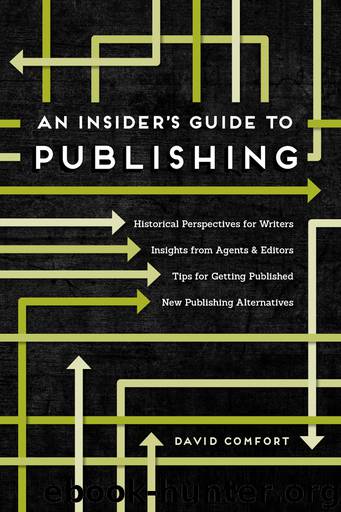An Insider's Guide to Publishing by David Comfort

Author:David Comfort [Comfort, David]
Language: eng
Format: epub
ISBN: 978-1-59963-781-5
Publisher: F+W Media
Published: 2013-04-16T04:00:00+00:00
PART VII
THE MAD, MAD, MAD, MAD WRITER
“This sickness, to express oneself. What is it?”
—Jean Cocteau
CHAPTER 27
THE CUCKOO’S NEST
“The good writing of any age has always been the product of someone’s neurosis.”
—William Styron
“This is what I find most encouraging about the writing trades: They allow lunatics to seem saner than sane.”
—Kurt Vonnegut
This much should be clear now: Given the professional hardships, one cannot want to write literature for a living and still be sane. Not just a little off—serious writing requires professional crazy. In his own life, no less than in his books, the novelist cannot let reality stand in his way.
Johns Hopkins professor William Egginton will soon release his eagerly awaited The Man Who Invented Fiction: A Biography of Miguel de Cervantes. Cervantes’ fictional alter ego, Don Quixote, fought giants that sane men saw as windmills. “Too much sanity may be madness,” he cried. In the end, he abandoned his crusades, surrendered his lance, and died sane as the doddering Alonso.
“How do you take away from a man his madness without also taking away his identity?” wondered William Saroyan, an admirer of the inventor of fiction and his hero.
Kerouac called the loss of reason “the highest perfect knowing.” He rhapsodized in his automatic writing travelogue, On the Road: “…the only people for me are the mad ones, the ones who are mad to live, mad to talk, mad to be saved … the ones who burn, burn, burn like fabulous yellow roman candles exploding like spiders across the stars and … everybody goes ‘Awww!’” Allen Ginsberg, a Bellevue psych ward alumnus, praised Jack, the Rocky Mountain Sanitarium grad: “Your stories of the madhouse are so actual that I feel again as I did in the Navy nuthouse—scared and seeing through heads. I used to sit with the worst ones to learn.”1
All of life’s mysteries are explained when we realize everybody is nuts, said Mark Twain. Beckett’s hero, Estragon, agreed: “We are all born mad. Some remain so.”
Given the rich history of literary madness, is it possible for today’s creative writer to be well balanced? Theoretically, yes. But such a writer is at a disadvantage in the essentials of art: imagination and energy.
Artists agree that there are two kinds of crazy: Creative = good, Destructive = bad. But the first can morph into the second slowly or suddenly in spite of every effort to stop it. “We have a high rate of self-destruction,” Doctorow told The Paris Review. “Do we mean to punish ourselves for writing? For the transgression?”
In the end, Maupassant was chained to an asylum wall, Virginia Woolf walked into a river, Plath turned on the oven. Or the fire is lost altogether, so Jerzy Kosinski put a bag over his head, Inge gassed himself, and Hunter Thompson, Richard Brautigan, and Hemingway painted walls. Before reaching the end of his own rope, David Foster Wallace said, “Ever notice that most writers shoot themselves in the evil uncontrollable command center—the head?”
Hemingway, whose physician father also blew out the command center,
Download
This site does not store any files on its server. We only index and link to content provided by other sites. Please contact the content providers to delete copyright contents if any and email us, we'll remove relevant links or contents immediately.
Asking the Right Questions: A Guide to Critical Thinking by M. Neil Browne & Stuart M. Keeley(5776)
Autoboyography by Christina Lauren(5236)
Eat That Frog! by Brian Tracy(4542)
Dialogue by Robert McKee(4405)
Sticky Fingers by Joe Hagan(4202)
Journeys Out of the Body by Robert Monroe(3625)
Annapurna by Maurice Herzog(3471)
Full Circle by Michael Palin(3450)
Schaum's Quick Guide to Writing Great Short Stories by Margaret Lucke(3381)
Elements of Style 2017 by Richard De A'Morelli(3350)
The Art of Dramatic Writing: Its Basis in the Creative Interpretation of Human Motives by Egri Lajos(3069)
Atlas Obscura by Joshua Foer(2963)
Why I Write by George Orwell(2955)
The Fight by Norman Mailer(2943)
The Diviners by Libba Bray(2939)
In Patagonia by Bruce Chatwin(2932)
The Mental Game of Writing: How to Overcome Obstacles, Stay Creative and Productive, and Free Your Mind for Success by James Scott Bell(2909)
Venice by Jan Morris(2575)
The Elements of Style by William Strunk and E. B. White(2475)
